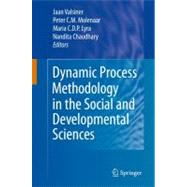
| The Unbearable Dynamicity of Psychological Processes: Highlights of the Psychodynamic Theories | p. 1 |
| Reviving Person-Centered Inquiry in Psychology: Why it's Erstwhile Dormancy? | p. 31 |
| How Methodology Became a Toolbox-And How it Escapes from that Box | p. 45 |
| The Two Disciplines of Scientific Psychology, or: The Disunity of Psychology as a Working Hypothesis | p. 67 |
| The Experimental Methodology of Constructive Microgenesis | p. 99 |
| The Schema Approach: A Dynamic View on Remembering | p. 123 |
| Against Reification! Praxeological Methodology and its Benefits | p. 141 |
| Grasping the Dynamic Nature of Intersubjectivity | p. 171 |
| Idiographic Data Analysis: Quantitative Methods-From Simple to Advanced | p. 191 |
| Depicting the Dynamics of Living the Life: The Trajectory Equifinality Model | p. 217 |
| Analysis of Intensive Categorical Longitudianal Data | p. 241 |
| Advances in Dynamic Factor Analysis of Psychological Processes | p. 255 |
| Hidden Markov Models for Individual Time Series | p. 269 |
| Multilevel Simultaneous Component Analysis for Studying Intra-Individual Variability and Inter-Individual Differences | p. 291 |
| Idiographic Microgenesis: Re-visiting the Experimental Tradition of Aktualgenese | p. 319 |
| Dynamic Methods for Research in Education | p. 353 |
| Social Dynamics in Complex Family Contexts and its Study | p. 383 |
| Dynamics of Life-Course Transitions: A Methodological Reflection | p. 405 |
| Dynamic Methodology in Infancy Research | p. 431 |
| Dynamics of Psychotheraphy Processes | p. 455 |
| Dramatic Life Courses: Migrants in the Making | p. 477 |
| Innovative Moments and Change Processes in Psychotherapy: An Exercise in New Methodology | p. 493 |
| Techno Parties, Soccer Riots, and Breakdance: Actionistic Orientations as a Principle of Adolescence | p. 527 |
| Dynamic Processes and the Anthropology of Emotions in the Life Course and Aging: Late-Life Love Sentiments and Household Dynamics in Tuareg Psycho-Biographies | p. 541 |
| Synthetic Phenomena and Dynamic Methodologies | p. 567 |
| Developmental Science: Integrating Knowledge About Dynamic Processes in Human Development | p. 595 |
| Cognitive and Interactive Patterning: Processes of Creating Meaning | p. 619 |
| Index | p. 651 |
| Table of Contents provided by Ingram. All Rights Reserved. |
The New copy of this book will include any supplemental materials advertised. Please check the title of the book to determine if it should include any access cards, study guides, lab manuals, CDs, etc.
The Used, Rental and eBook copies of this book are not guaranteed to include any supplemental materials. Typically, only the book itself is included. This is true even if the title states it includes any access cards, study guides, lab manuals, CDs, etc.